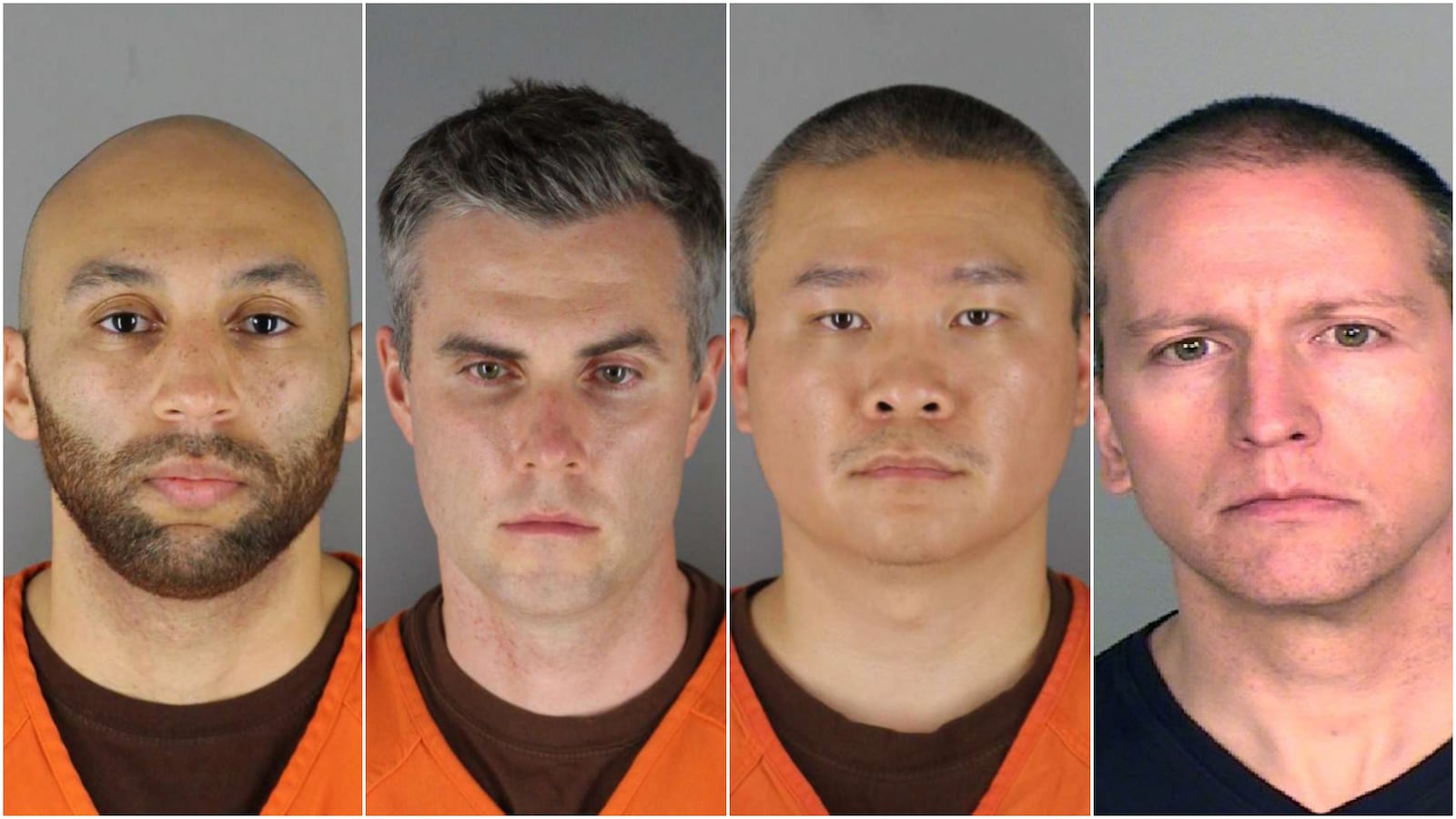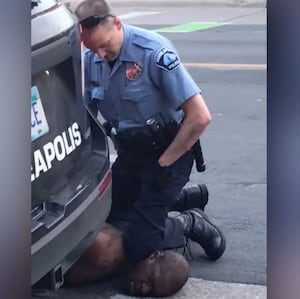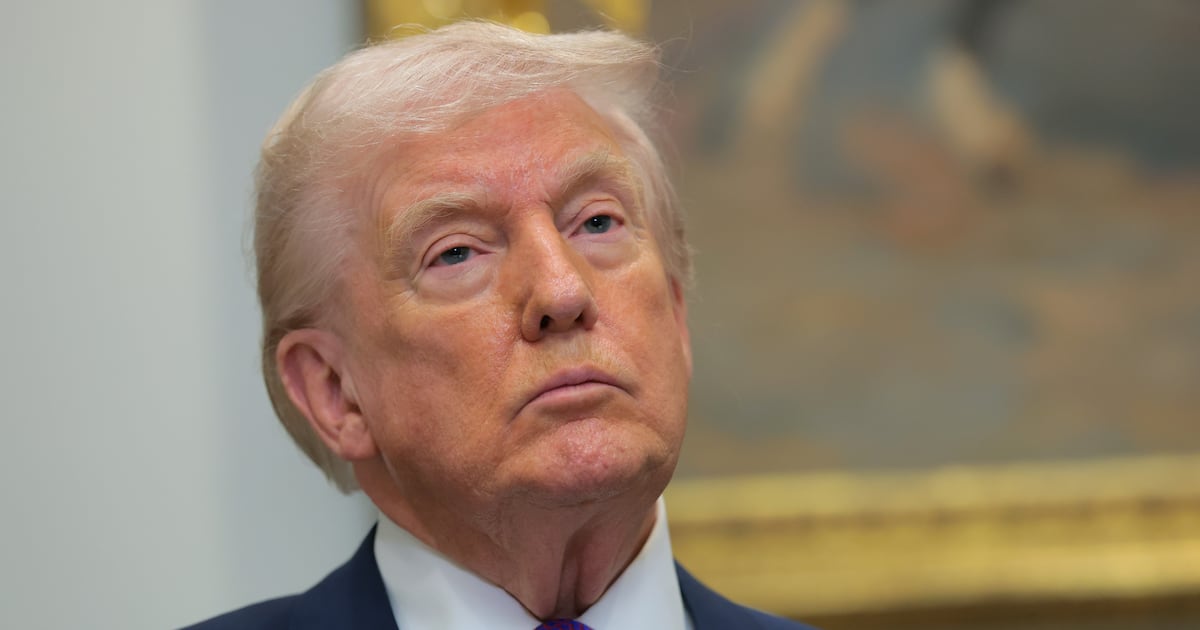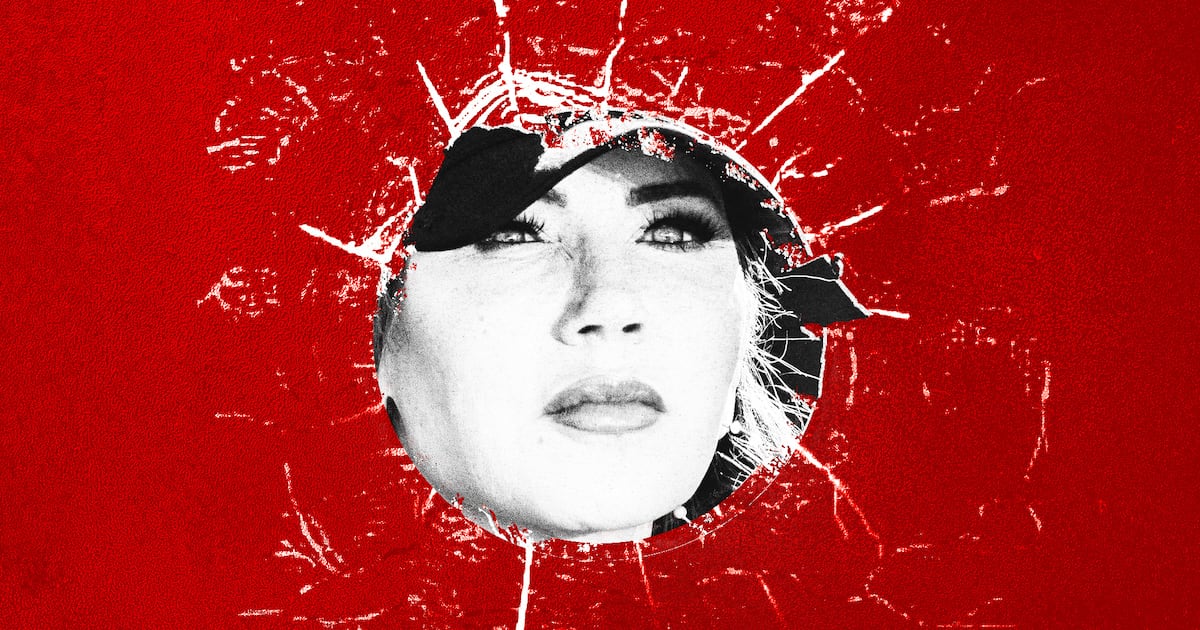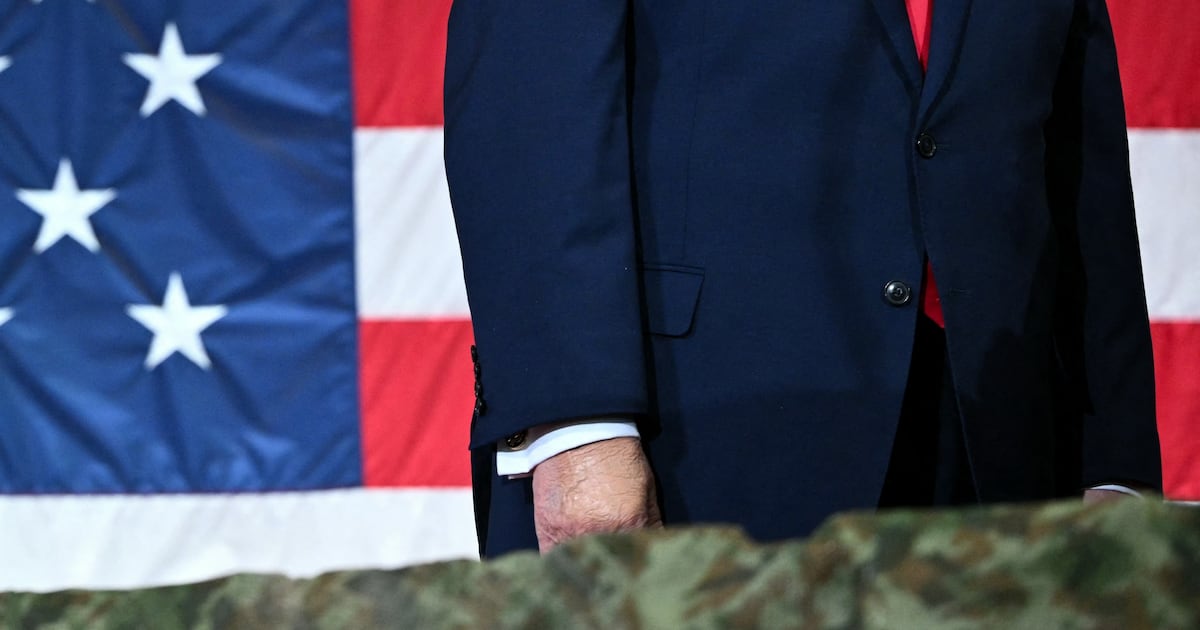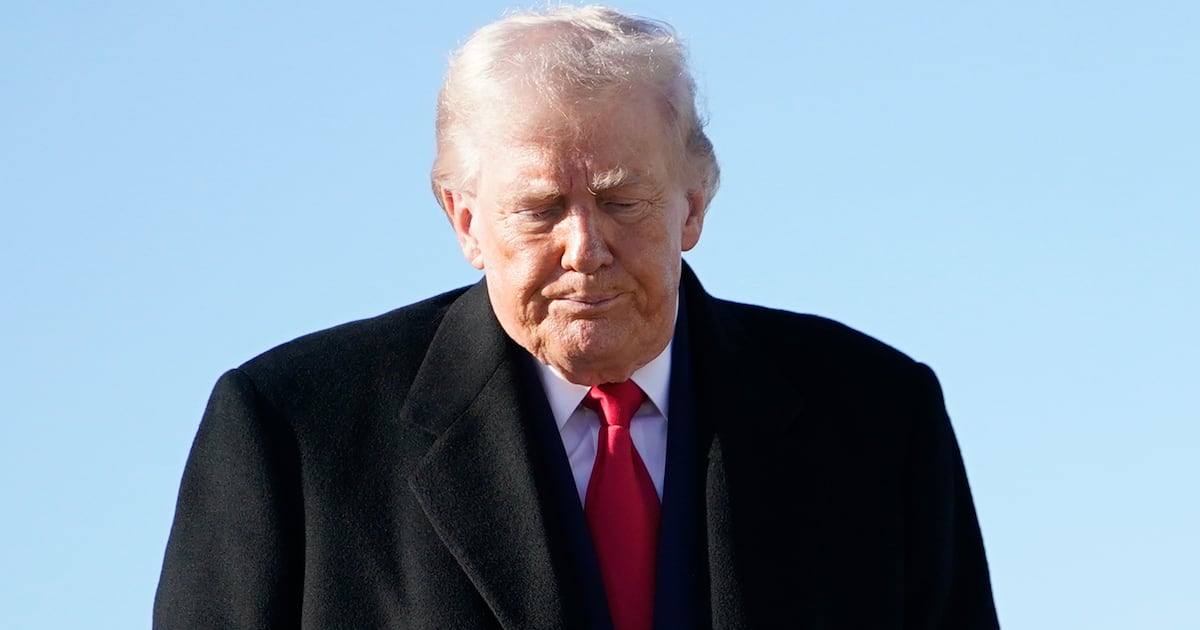Minneapolis prosecutors argued Friday that the four ex-cops charged in George Floyd’s death should face a single jury after participating in the May 25 incident “together”—but their lawyers argued a collective trial would be against the “interest of justice” in the latest indication the men are turning on each other.
During a court appearance, attorneys for Derek Chauvin, Tou Thao, Thomas K. Lane, and J. Alexander Kueng argued each of their clients should get their own trial, highlighting the media scrutiny of the case and the differing roles each played in the tragic arrest.
In filings prior to Friday’s hearing, each officer pointed a finger at the others. Attorneys for Lane and Kueng argued they were only following Chauvin’s lead—while Chauvin’s lawyer argued Floyd would be alive if the rookie cops had called an ambulance sooner or “chosen to de-escalate instead of struggle.”
Thao’s attorney, Robert Paule, claimed Friday “there are going to be side attacks” if all four officers face a trial together, and stressed that the men are already facing an uphill battle due to publicity of the case.
“I’ve never had a case where the prosecution announces on TV my client is guilty,” Paule said.
Special Attorney for the State Neal Katyal, however, argued separate trials would “delay justice for months, if not years,” and would be “traumatizing” for witnesses who would have to testify multiple times.
“The community should not be put through the trauma of four separate verdict days,” Katyal said, adding that the defenses posed by the officers are not “antagonistic.”
Referring to the multiple gut-wrenching videos of Floyd’s arrest, Katyal added, “I’ve seen a lot in my life, I can barely watch these videos.”
Later in the hearing, the prosecutor slammed an expected defense argument that Floyd, who had fentanyl in his system, overdosed during the arrest, sarcastically stating that attorneys believe Floyd took “just the right amount to overdose the exact moment when the officer’s knee was on his neck for 8 minutes.”
Outside court, Floyd’s family slammed the defense for “lying” and trying to “assassinate his character” by suggesting Floyd died from an overdose. “After what I heard in that courtroom, I’m angry,” one of Floyd’s brothers said. “The one thing I want is accountability.”
Benjamin Crump, the family’s attorney, added, “The only overdose that killed George Floyd was an overdose of excessive force and racism by the Minneapolis Police Department. The world saw what happened and so who are you going to believe? Your eyes or these killer cops?”
Chauvin, 44, is facing second-degree murder, third-degree murder, and second-degree manslaughter charges after holding his knee on Floyd’s neck for almost nine minutes. The other three have been charged with aiding and abetting second-degree murder while committing a felony, and aiding and abetting second-degree manslaughter with culpable negligence.
All four officers have requested the trial move out of the Twin Cities area due to the excessive amount of publicity. Cahill said Friday that, before a decision is made on where the trial will take place, he wanted residents to get a detailed questionnaire to see what effect pretrial publicity could have on a future jury.
“There is not a county or state in this country that has not had publicity in the George Floyd case,” Hennepin County Judge Peter A. Cahill said Friday. Arguing jurors might feel pressure to find the four men guilty, Thao’s attorney fired back, “We have had cities ablaze because of these cases.”
Floyd’s death prompted residents in all 50 states and dozens of countries to take to the streets for both peaceful and destructive protests against racial injustice and police brutality.
While the four men were fired a day after footage of the arrest was released, prosecutors argued in court filings the men should be criminally charged together for Floyd’s “murder.”
“[A]ll four defendants worked together to murder Floyd: Chauvin, Kueng, and Lane pinned Floyd face-down, while Thao stopped the crowd from intervening, enabling the other defendants to maintain their positions. Defendants also discussed and coordinated their actions throughout the incident,” prosecutor said.
However, Kueng and Lane’s attorneys have argued that the two rookies had been full-time officers for less than a week and were following Chauvin’s orders. Thao’s attorney has also pinned the blame on Chauvin and stressed his client’s actions were “absolutely distinct” from the others.
“[Thao] never touched Mr. Floyd,” Paule stressed in court Friday, noting that Chauvin and Thao arrived on the scene after Kueng and Lane.
“The other defendants are clearly saying that, if a crime was committed, they neither knew about it or assisted in it,” Chauvin’s attorney, Eric Nelson, wrote. “They blame Chauvin.”
Nelson argued that Lane and Kueng exacerbated Floyd’s alleged condition “considerably” by trying to force him into their squad car, and argued if the two officers believed he was “on something” they should have called for a paramedic sooner.
“If EMS had arrived just three minutes sooner, Mr. Floyd may have survived. If Kueng and Lane had chosen to de-escalate instead of struggle, Mr. Floyd may have survived,” Nelson wrote. “If Kueng and Lane had recognized the apparent signs of an opioid overdose and rendered aid, such as administering naloxone, Mr. Floyd may have survived.”
Lane’s attorney, Earl Gray, wrote in his motion that Floyd was moving as Lane and Kueng approached him, and didn’t obey their orders to show his hands. Gray has previously argued that Lane tried to intervene as Floyd was pinned on the ground but was rebuffed by Chauvin, a 19-year veteran who had been the two new cops’ field training officer.
“It’s plausible that all officers have a different version of what happened,” Gray said.
Minneapolis Police Chief Medaria Arradondo has previously rejected the notion that the two officers’ rookie-status was an excuse for not intervening, saying, “This was murder; it wasn’t a lack of training.”
According to body-camera footage, Chauvin had his knee on Floyd’s neck for 8 minutes and 46 seconds—including nearly three minutes in which Floyd was unresponsive. EMTs said that he had no pulse when he was loaded into an ambulance.
In a motion to dismiss the charges against Chauvin, his attorney argued that the 44-year-old officer actually “exuded a calm and professional demeanor” with Floyd.
“Chavin was clearly being cautious about the amount of pressure he used to restrain Mr. Floyd—cautious enough to prevent bruising,” Nelson wrote, arguing that Floyd died from chronic health issues and drug abuse.
The Hennepin County Medical Examiner concluded Floyd died due to cardiac arrest from the restraint and neck compression, indicating Floyd had heart disease and there was fentanyl in his system. An independent report commissioned by Floyd’s family, however, concluded that the 46-year-old died of strangulation from the pressure to his back and neck. Both reports determined Floyd’s death was a homicide.
Minnesota Assistant Attorney General Matthew Frank said Friday the prosecution wanted stiffer sentences for the four officers if they are convicted, arguing Floyd was vulnerable when he was handcuffed because he couldn’t “fight back,” and was treated with “particular cruelty” by those in a position of authority.
“He was completely vulnerable. He can’t move or breathe,” Frank said. The judge said that while prosecutors “have made a show of particular cruelty” as a factor that would result in a harsher sentence, he wanted both sides to file a motion to argue their case on possible punishment.
The socially-distanced hearing in Hennepin County courtroom on Friday was the first time Chauvin—who is being held on $1.25 million bail—has appeared in person since his June arrest. The three other officers are out on bail.
A few dozen protesters gathered in the street chanting “no justice, no peace” ahead of the hearing. As Floyd’s family members left the courthouse, they were met with chants of “we got your back.” Kueng and Lane were surrounded by protesters as they left, while Chauvin was taken away in a Kevlar vest.
On Friday, Judge Cahill also disqualified four prosecutors with the Hennepin County Attorney’s Office from the participating in the prosecution, claiming their decision to meet with the medical examiner who performed Floyd’s autopsy two days after his death was “sloppy.” The barred prosecutors, including Hennepin County Attorney Mike Freeman, can now only participate in the trial as witnesses.
Cahill also stated he would not yet consider the separate motion from all four officers to have criminal charges dropped altogether, but warned both parties not to “read anything into that.”

